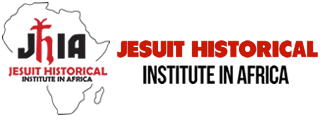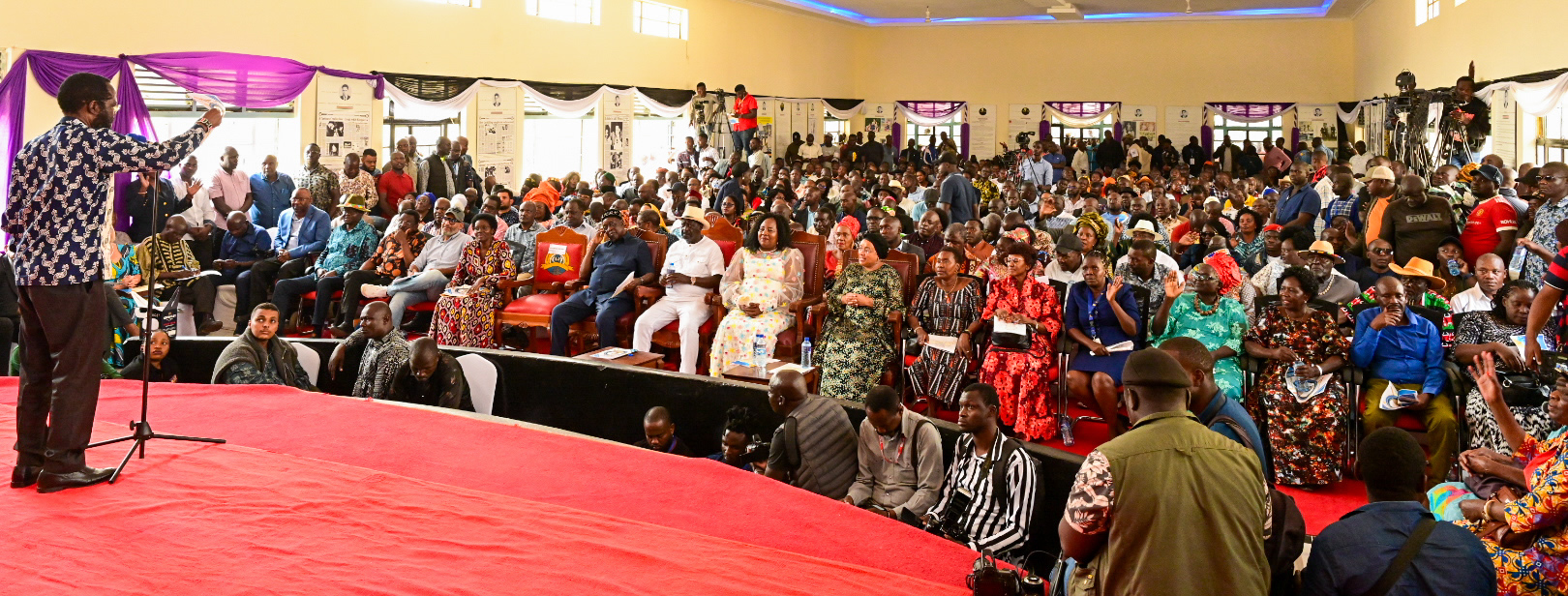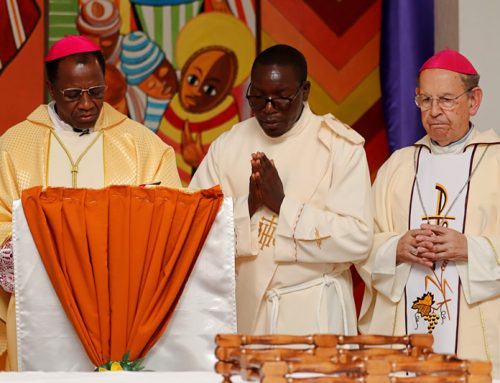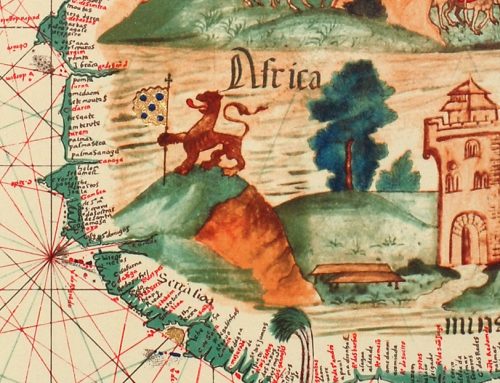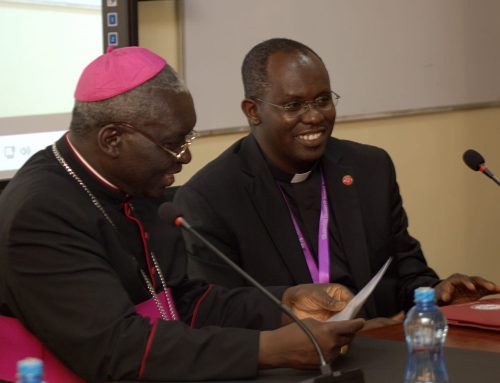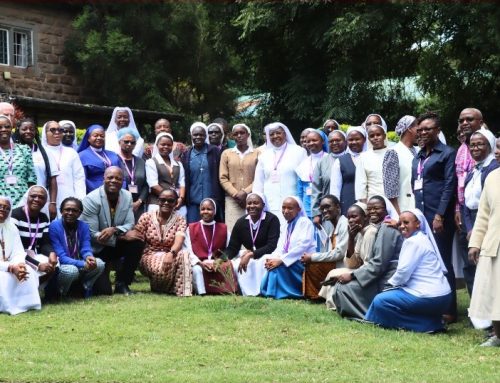It was a busy January morning typical of my Monday office routine. I was responding to a series of query emails, from researchers and scholars, posted over the weekend, seeking access to materials and records within our collection.
While seated on my high-back mesh chair, the phone rang and I heard an influential male voice from the other end, “Hello Good Morning, my name is Eddy. Is that the Jesuit Historical Institute in Africa?” I affirmed and he continued. “I’m making this inquiry call on behalf of the Governor of the County Government of Kisumu who is looking for a resource listed on your online catalog titled My Journey with JaramogiOginga Odinga: Memoirs of a Close Friend authored by Odinge Odera”. Eddy, an Advisor, Liaison, and Partnerships Officer in the Governor’s Office, continued before I could respond. “Would you be able to lend him the book because he is preparing for a Public Lecture and may want to refer to it?”
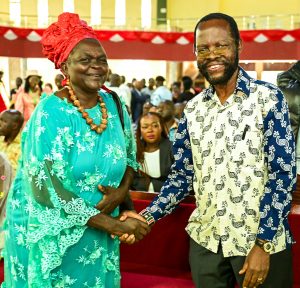
Kisumu Governor Prof. Peter Anyang’ Nyong’o exchanges Pleasantries with one of the two surviving wives of Jaramogi (Susan Odinga) during the 30th Commemoration of Jaramogi Odinga at ACK St. Stephen Cathedral Milimani Kisumu shortly before the Service
At this point, I knew from an institutional policy position that it was impossible, that the book would leave the library doors on loan, but I had to respond nevertheless. I asked for some time to check first since I wanted to confirm the availability of the physical book, which I discovered was properly positioned on the shelf. I went ahead to explain to Eddy that we are not a lending library, but rather an archive and that if the material was to be accessed, someone would have to physically come on-site to access it.
During our conversation, he disclosed that the book is a rare resource because it is in the possession of JHIA and another institution whose name he did not disclose. I discovered that the First Lady of Kisumu County Government, Dorothy Nyong’o, was a contributor to the book. I went ahead and asked the caller for a formal request via email so that I could follow up on how best to respond to their urgent need without any policy compromise or even infringing on the author’s intellectual property rights. We eventually found a way out because they only needed a part of the chapter which the County First Lady contributed to.
This particular event piqued my interest because I work in a historical institution. It so happened that the event coincided with my visit to Kisumu on a personal errand, and therefore decided to attend the memorial and imbibe the wisdom of some of the most distinguished personalities in the land.
The commemoration took place on January 20th, 2024 which began with a memorial service at St. Stephen’s Cathedral and later culminated in a Public Lecture at the Ofafa Memorial Hall in Kisumu. The presiding Minister was The Rt. Rev. Charles Ochieng Ong’injo, Bishop of Maseno South Diocese assisted by the Curates of St. Stephen’s ACK Cathedral Kisumu who delivered a sermon on the grounds of leading people with a self-sacrificing attitude, a quality that Jaramogi espoused. The clergy used the podium to point out shortcomings in the country’s governance and chastise important institutions for failing to do their share to remedy wrongs. “Parliamentarians and Governors must lead from the front. We cannot shout about the Kenya Kwanza government yet our own houses are dirty.” He said.
Many describe Jaramogi as the Kenyan President who never was! He never ruled but he reigned. The firebrand politician was the first Kenyan vice President (1964-1966) in the Jomo Kenyatta regime. He resigned in 1966 when his ideologies and those of the ruling party Kenya African National Union (KANU) clashed.
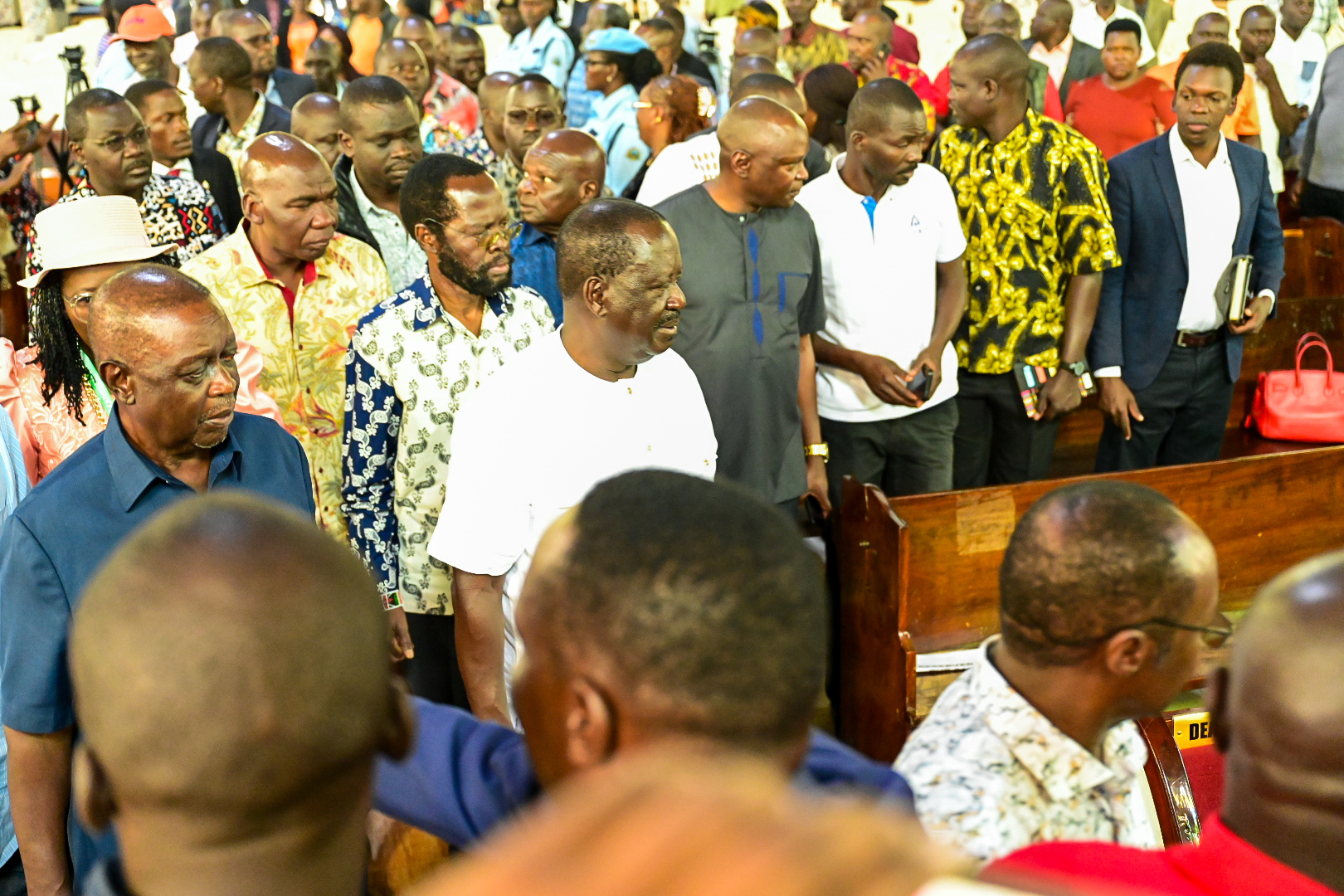
Azimio Leader Raila, Dr. Oburu (Siaya Senator) Peter Anyang’ Nyong’o (Kisumu Governor), and other Guests during a Memorial Mass at ACK St. Stephens Cathedral in Kisumu
A family member who was invited to give a thanksgiving tribute noted, “Jaramogi Oginga Odinga was Kenya’s greatest nationalist who throughout his life remained a voice of reason, standing taller than his compatriots in the reputation, performance, and respect. Of all the Kenyan Politicians, Odinga was the most committed to the notion that Kenyatta should be the first President and there is no evidence that he ever contemplated changing him for presidency. He qualified to become the first President of Kenya, not because he was a Luo, but because he was one of the best nationalists that Kenya ever had.”
Interestingly, when writing this piece, I discovered that the word Jaramogi means fearless and that the Individuals with the name Jaramogi have, interestingly, a strong inner desire to organize, control, lead, and achieve wealth, power, and status. Jara Ramogi means “son of Ramogi” in the native Luo language.
A beehive of activity was visible at Ofafa Memorial Hall, where the Public Lecture was held. Leaders from across the political spectrum, prominent scholars, Pan-Africanists, religious leaders, and journalists gathered to mark Jaramogi Oginga Odinga’s 30th Anniversary. Many of these politicians are considered his political students, whom he mentored and who continue to support his beliefs even after his death.
The memorial to a national hero, known for his role and eminence in Kenya’s independence struggle and influence on the country’s political scene, served as both a family commemoration and a public celebration. The Governor of Mombasa County, Abdullswamad Sherriff Nassir, affectionately known as Governor 001, announced that he would be granting Mombasa County the authority to rename a street in Mombasa City in honor of the Late Mzee Jaramogi. He also requested the family to grant the state permission to honor the hero in many ways that he deserves. Second, he asked the family for permission to hold the next remembrance in Mombasa County, stating that his administration was prepared to support the occasion so that other Counties may follow suit. This way the county will be able to distinguish that Jaramogi and other freedom fighters and fathers of democracy agitated for national interests and not ethnic or regional interests. The arena was swamped with traditional dancers demonstrating their agility and skills. Several publishers and agents displayed historical titles and publications linked to the anniversary: A leap into the future, Presidential or Parliamentary Democracy in Kenya? Choices to be Made by Peter Anyang’ Nyong’o, Raila Odinga: The Flame of Freedom by Sarah Elderkin-Forward Olusegun Obasanjo, Not Yet Uhuru: An Autobiography by Jaramogi Odinga Oginga and Echoes of the Mourner-Ajiki Kodi Yamo by Jotham H. A. Oudu and many more others.
A historic address was delivered by three Keynote Speakers among them, Prof. Anyang’ Nyong’o the Governor of Kisumu County and a political student of Jaramogi described him as an honest leader citing one of his books titled Not Yet Uhuru.“The struggle for Independence is not just about freedom from colonialism, it is also the struggle for economic, social, and political justice for all.”
The second one was Prof. Michael Chege, a distinguished scholar in African development studies who revealed some key details left out by history books about Jaramogi Oginga Odinga and which came out in two major biographies that were published recently (2023) and which mentioned him as a key player in the fight for the liberation of Africans not only in Kenya but also in other parts of the continent. One of these books was about the Great Martin Luther King who made some revelation of how Jaramogi contributed as a signatory to the membership document of the United Nations when he provided the instruments of accession to Kenya to the United Nations in December 1964 as the representative of the President of the Republic of Kenya. The second revelation is found in a book title that speaks about the death of Patrice Lumumba, a man dear to Jaramogi whose ways were similar because both fought for the rights of the African people in big ways in different parts of the world. Jaramogi also represented Kenya at the founding of the Organization of African Unity (OAU) on May 25th, 1963.
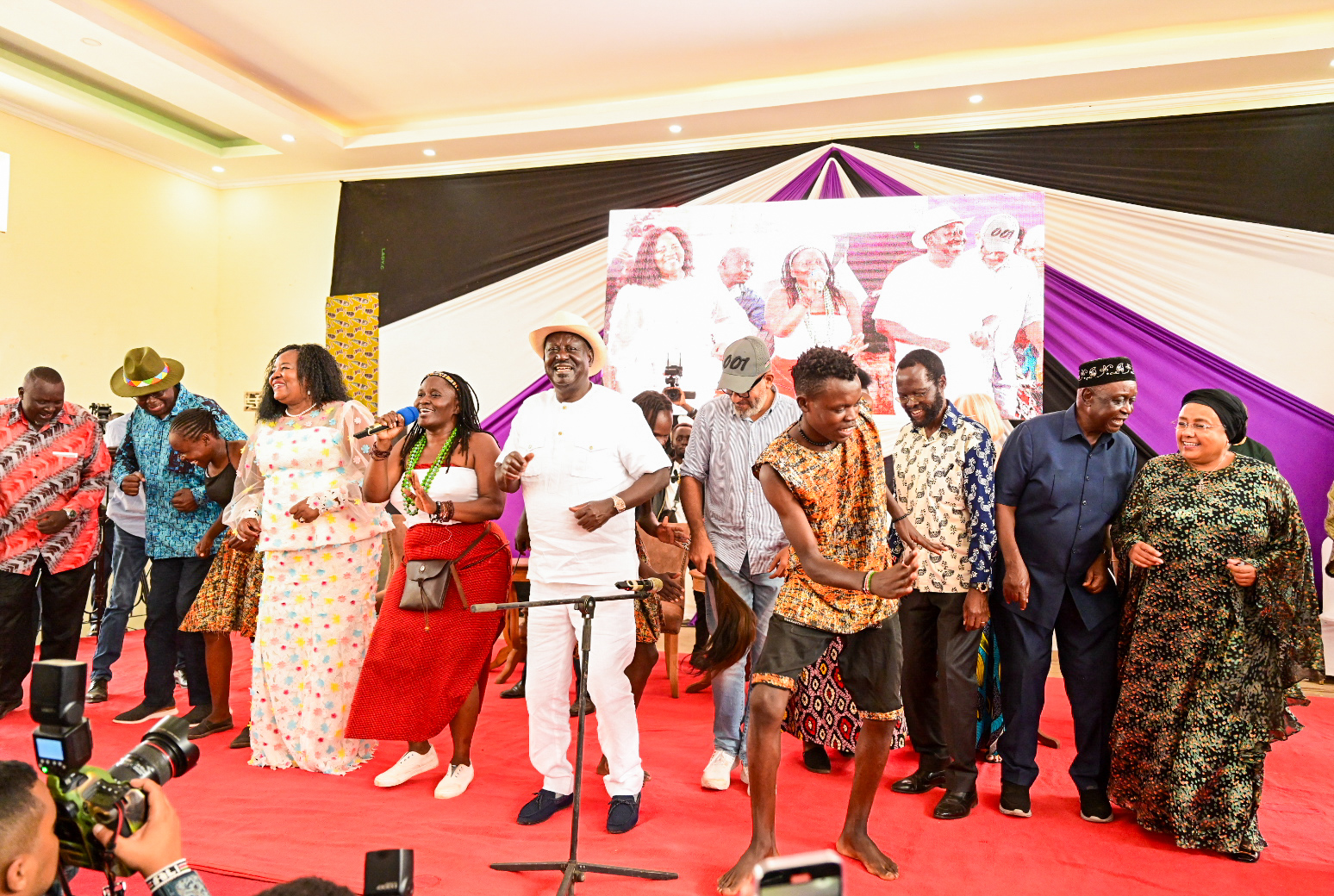
Azimio Leader Raila and his wife Ida, Former First Lady and other High Profile Guests Join dancers at the Ofafa Memorial Hall in Kisumu to Mark the 30th Jaramogi Anniversary
The third Speaker Ambassador Dr. Olara Otunnu, a Ugandan politician, diplomat, and lawyer graced the occasion with his strong delegation. In his keynote speech, he admitted he first met Jaramogi in New York, as his Residence Assistant in the early 1980s. Dr. Olara admires Jaramogi’s faithfulness, courage, sense of duty, tenacity in the struggle and coupled with a very rare denial to serve the greater good of the community most importantly, despite his struggles of many years, he was still committed to reconciliation which he observes that they were attributes not accidental. Jaramogi spoke of Not Yet Uhuru (Independence) because he was opposed to how some African leaders used ethnic differences and wealth to separate people; he wanted power to remain with the people’s choice.
Historical proof supports that Jaramogi’s struggles were for all oppressed Kenyans and Africans. He was offered the presidency and he declined, insisting that Jomo Kenyatta was the bonafide leader for the Kenyan African people. What a selfless and patriotic act! Sadly, neo-colonialism has superimposed the independence and freedom ideals that had been envisaged. So Kenyans and Africans need to go beyond Jaramogi’s footprints not only of administrative self-governance but also shun the dictates of social, moral, and cultural influences from outside. Let our communal life and care for each other thrive and discard our corrupt and greedy leaders who oppress other Africans. You cannot hold a leader accountable if you are not clean as an individual. So the question begs: How prepared are we as Kenyans or Africans to confront these realities?
Geoffrey Obatsa,
Administrative Assistant JHIA
